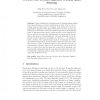Free Online Productivity Tools
i2Speak
i2Symbol
i2OCR
iTex2Img
iWeb2Print
iWeb2Shot
i2Type
iPdf2Split
iPdf2Merge
i2Bopomofo
i2Arabic
i2Style
i2Image
i2PDF
iLatex2Rtf
Sci2ools
101
click to vote
AI
2010
Springer
2010
Springer
A Three-Way Decision Approach to Email Spam Filtering
Many classification techniques used for identifying spam emails, treat spam filtering as a binary classification problem. That is, the incoming email is either spam or non-spam. This treatment is more for mathematical simplicity other than reflecting the true state of nature. In this paper, we introduce a three-way decision approach to spam filtering based on Bayesian decision theory, which provides a more sensible feedback to users for precautionary handling their incoming emails, thereby reduces the chances of misclassification. The main advantage of our approach is that it allows the possibility of rejection, i.e., of refusing to make a decision. The undecided cases must be re-examined by collecting additional information. A loss function is defined to state how costly each action is, a pair of threshold values on the posterior odds ratio is systematically calculated based on the loss function, and the final decision is to select the action for which the overall cost is mini...
AI 2010 | Artificial Intelligence | Bayesian Decision Theory | Incoming Emails | Three-way Decision |
Related Content
| Added | 18 Jul 2010 |
| Updated | 18 Jul 2010 |
| Type | Conference |
| Year | 2010 |
| Where | AI |
| Authors | Bing Zhou, Yiyu Yao, Jigang Luo |
Comments (0)

